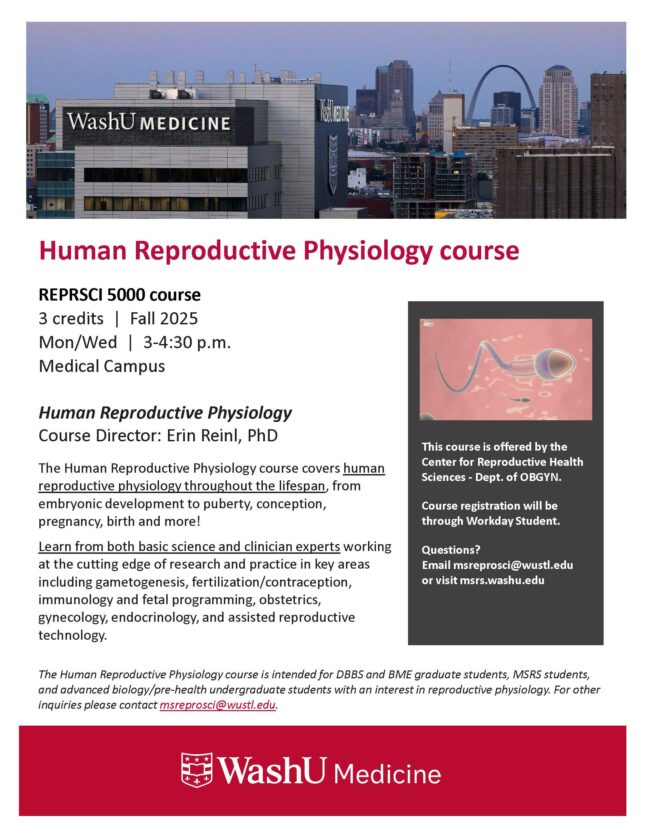The course “Human Reproductive Physiology” (ReprSci 5000, 3 credits) is being offered by the Center for Reproductive Health Sciences within the Department of Obstetrics and Gynecology at Washington University School of Medicine in St. Louis. This course is intended for students in DBBS and BME graduate students, MSRS students, and advanced biology/pre-health undergraduate students with an interest in reproductive physiology. It takes place on the Medical Campus in the fall semester.
Through this course, students will learn from both basic science and clinician experts working at the cutting edge of research and practice in key areas including gametogenesis, fertilization/contraception, immunology and fetal programming, obstetrics, gynecology, endocrinology, and assisted reproductive technology. ReprSci 5000 is designed to give students a comprehensive foundation in human reproductive physiology through a variety of learning modalities. The course focuses primarily on normal physiology of human reproductive systems, although some lecturers will introduce pathologies and/or relevant animal models as a way to strengthen subject matter understanding. This course aims to deepen student knowledge of the human reproductive systems down to the cellular and molecular levels to 1) connect them with their own physiology, and 2) broaden their understanding of the biological systems integral to the human experience. The course material will provide students with foundational knowledge in reproductive physiology that will help prepare them for medical school, biomedical research, and careers in the field of reproductive sciences.

Although primarily lecture-based, this course also includes discussion of peer-reviewed journal articles and dialog with lecturers regarding pre-assigned questions. These additional modalities are intended to give students an opportunity to apply their new knowledge in the classroom. Lecture topics will occur in three modules of varying lengths throughout the semester. To give students the most up-to-date knowledge, lectures will be presented by experts on the given topic of the day, and thus students should be prepared for differing lecture styles from each lecturer.
- Module I – Development to Reproduction – gonads and gametogenesis, puberty, hormonal cycles and neuroendocrinology, fertilization, infertility, assisted reproductive technology, and contraception.
- Module II – Embryogenesis and Gestation – early embryo, implantation, placentation, embryogenesis, maternal adaptation to pregnancy, and fetal programming.
- Module III – Parturition and Beyond – parturition, lactation, early parental behavior, menopause and reproductive aging, transgender health and reproductive considerations, social determinants of reproductive health, and the role of reproductive sciences in society.
Course enrollment takes place through Workday Student. Questions about the course? Email msreprosci@wustl.edu.